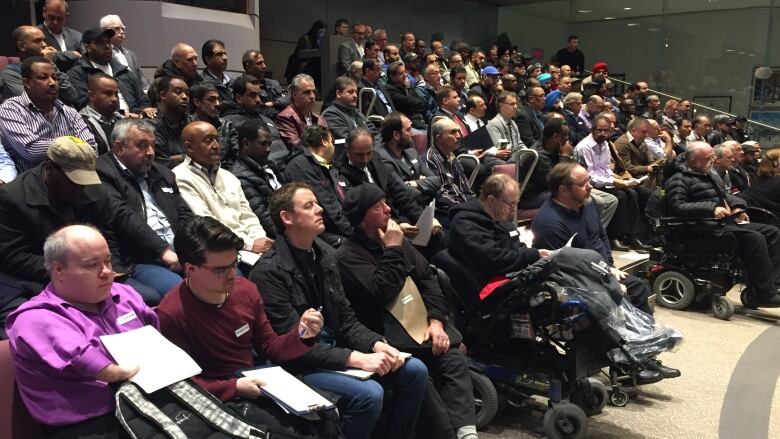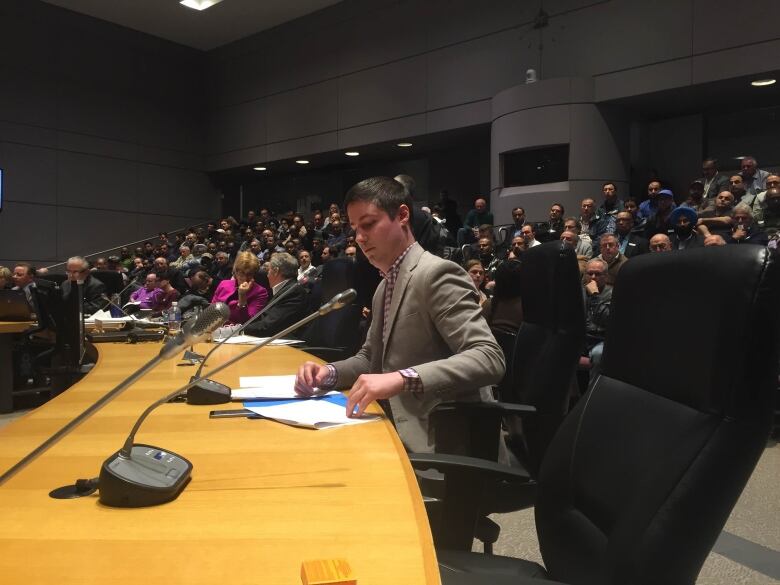Uber won't slow down to await legalization, Ottawa committee told
Security cameras one focus of lengthy Thursday committee meeting on regulation plan

Securitycameras were a main point of contention at a lengthy committee meeting Thursday as nearly 100 people signed up to weigh in on the City of Ottawa's plan to legalizeapp-basedride-hailing services like Uber.
The taxi industry is pushing forUberto join themin having cameras in their vehicles, but UberCanada is resisting the move and said it will not commit to suspending operations in Ottawa pending legalization of the service.
- City of Ottawa recommends legalizing Uber
- Ottawa taxi industryissues list of demands on eve of Uber debate
- Uber applauds Ottawa's 'fair' plan to legalize ride-hailing services
UberCanada's ChrisSchafer, the first person signed up to speak before Thursday's special meeting of the community and protective servicescommittee, said the service is"operating in good faith" in jurisdictions across the world as new regulations are formulated.
Schaferdid not give a definitive answer on suspending services, however.

"So, the short answer is no," saidCoun. KeithEgli.
"We look forward to operating in a regulated environment," Schafer replied.
Last week, the City of Ottawa unveiled a plan to legalize app-based ride-hailing services, such as Uber, at the end of a lengthy taxi bylaw review.
Councillors on the community and protective services committee are hearing from people on various sides of the issue before debating the recommendations, which include reducing fees for traditional taxi drivers and introducing regulations for ride-hailing services.
The plan, backed by Uber,would require all vehicles for hire to have a minimum $5 million of liability insurance, and all drivers to undergo a police check and provide copies of their driving records.
But leaders in Ottawa's taxi industry have arguedthe city's planwould create a two-tiered system due to differences in fare models, varying overhead costs and the fact that cameras would still be required in taxis but not inUbers.
Yesterday, the taxi industryissued a list of nine demands to be considered by the cityas it moves to change taxi regulations.One demand was thatUbercease operations in Ottawa immediately "until new Ontario provincial legislation for greater enforcement powers to Ontario cities is introduced and authorized into law."
Camera debate
For nearly three hours,Schaferwas grilled bycouncillorsabout cameras in vehicles, driver training, accessibility standardsandsurge pricing an increase in fares when demandis high. Manycouncillorsbrought up the fact thatUberwas currently skirting the law by operating illegally.
Courtney Francis, thehead of taxi booking serviceZipTrack, was one of several whotold the committee that cameras should be mandatory for all vehicles.
Francissaid thatthetaxi industry has helped police in five of the city's sixhomicides so far this year but he didn't explain exactly how.
Asked about cameras by several councillors, Schaferargued thatcameras aremeant to keep drivers safe because they're picking up unknown customers andaccepting cash payments.
Uberdrivers and their passengers have access to information about each other prior to pickup through their profiles on the app, and payments are exclusively done via credit card through the app, whichSchafer said eliminates the need for cameras.
Schafer also said that half of Uber drivers work 10 hours a week, and that requiring cameras would be prohibitively expensive.
He added that a city-commission report, done by the consulting firm KPMG, did not recommend cameras in ride-hailing servicessuch as Uber.
Training and surge pricing
Coun. Diane Deans, who chairs the committee,said last week the plan is "takingthe handcuffs off" the taxi industry while also responding to the public's demand for"greater choice in their transportation options."
Mayor Jim Watson hasalso said he backsthe plan.
The city has recommended scrapping mandatory training for taxi drivers but the taxi industry wants to keep it and forceUberdrivers to be professionally trainedas well.
UberCanada has argued that its rating system, combined with"real-time feedback" from passengers, is a system that works and that thevolume ofUberusers in Ottawa is an endorsement of its customer service.
Severalcouncillorsalso asked questions about surge pricing,part of theUberpricing model that taxi drivers have described as unfair as their fares are capped by a meter.
Schafertold the committee that surge pricing comes into effect when supply and demand is "out of whack," and that it'sdetermined by an algorithm not drivers.
He said it's unlikelyUberwould share their algorithm with the City of Ottawa due to proprietary issues.
About 15 to20 per cent ofUbertrips are subject to a surge, said Schafer, andmost surge situations are still cheaper than traditional taxis.
Users arewarned about surge pricing before the ride is confirmed, given fare estimates and asked to double confirm if the surge is more than two times the regular price, he said.
Meeting could continue into weekend
Accessibility concerns have also been raised, as Uber doesn't currently have wheelchair-accessible vehicles in Ottawa.
City recommendations includepetitioning the province for authority to create a mandatory accessibility levy forUberand other services like it.
Schafer said Uber would be willing to voluntarily pay an accessibility fee even without being ordered to by the province.
Brian Wade, chair of the Accessibility Advisory Committee,said companies likeUbershould have 15 per cent of vehicles be accessible, if not pay a levy.
Bob Brown from the Council of Canadians with Disabilities also urged the committee to emphasize accessibility moving forward.
Others who addressed the committeeincludedhead of the Ottawa taxi unionAmrikSingh,Marc Andre Way, co-owner of Capital Taxi and head of the Canadian Taxi Association,the assistant to the president ofUnifor,Bob Orr,as well as drivers working for bothUberand traditional cab companies.
As the meeting dragged on for 11 hours, people signed up to speak left the meeting, and in the end50 people addressed the committee.
If approved by the committee, the recommendations will head to council for review and final approvalon April 13.
The city's initial plan was to havenew regulations come into effect as early as June 30, if given the green light by council. But a newmotionproposes Sept. 30 as the new implementation date to give more time to adjust.












_(720p).jpg)


 OFFICIAL HD MUSIC VIDEO.jpg)
.jpg)



























































































